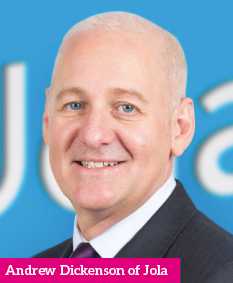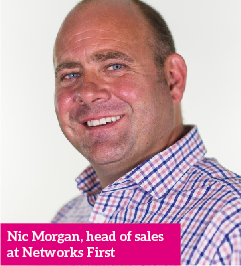
Up to 1988 I had spent my entire sales and marketing career in a direct sales environment – with Lever Industrial Chemicals, ICL/Fujitsu and lastly BT. To be fair there were few tech channels that I had come across during this time in the sectors I was working and it was only towards the end of my time at BT that I became aware of a growing set of resellers and distributors in the comms sector.
In 1988 I got a job as UK channel manager for STC selling SDX PBX systems and my world changed. BT was suddenly the enemy as were all the resellers for long forgotten vendors.
At STC, for the products I was responsible for, we had a channel only policy. In the years I was there I never saw one system sold directly to an end user and from that perspective life was uncomplicated. However, in the mid 90’s I found myself running a channel for a PBX vendor that had a direct sales force as well.
 To be honest, it was manageable – although there were moments when it drove me mad. Inevitably, when you are selling the same products the direct sales team would find themselves pitching for the same business as one or more of my dealers. Despite the company rules there was never a resolution that left all parties happy. Inevitably you end up with a de-motivated dealer or a demotivated sales person.
To be honest, it was manageable – although there were moments when it drove me mad. Inevitably, when you are selling the same products the direct sales team would find themselves pitching for the same business as one or more of my dealers. Despite the company rules there was never a resolution that left all parties happy. Inevitably you end up with a de-motivated dealer or a demotivated sales person.
So having worked in each of these environments of direct, channel only and mixed and since then as editor of this magazine working closely with the channel I have my own views on the issue.
My personal views are as follows:
- There will always be conflict with resellers if you also sell directly to the same customer groups.
- You can get away with having both direct sales and a channel if you define and stick to a separation policy. For example, channel sales for SME and mid market but direct sales for corporate and enterprise users. This is a common strategy throughout the channel today as vendors seek to widen their reach yet still cherry pick.
- You can’t say you are a ‘channel centric’ company if you also sell direct. This is like being just a little bit pregnant.
- It is difficult, if not impossible, to equally provide adequate support for a direct and a channel sales organisation either internally or externally.
- I understand the need to seed new markets and products prior to channel release.
As I say, these are my opinions and I always welcome comment and discussion on any aspect of channel strategy.
We actually keep a list of firms we know to be channel only (small) and those that either sell direct or have both routes to market (large) together with details on the percentage of direct/channel business they achieve (few).
Last year you may recall that I wrote a piece on an expected rise in direct sales for a well-known firm following their recent acquisition activity. To be honest it was not well received so we tend to keep that list to ourselves.
Channel Only Suppliers:
You’d think that a reseller would prefer to deal with channel only suppliers but that is definitely not the case.
Phil Reynolds, Joint CEO at Oak, says his firm has always been a channel only supplier.
“If we do get a direct approach from an end-user our first question is always ‘who is your reseller partner’. We try and find who supplied the user telephone system and see if we already have a relationship with that company and take it from there.
Over 98% of sales are through our channel. There are exceptions and these are where following a direct approach to Oak it turns out the user reseller partner deals with a competitive supplier or where customisation of a solution is very complex. Many resellers will not want to handle or front up this kind of enquiry but welcome us providing them a finders fee.”
Reynolds says that being a channel only supplier does not necessarily draw resellers to them over suppliers that have a mixed strategy but that it does help maintain closer relationships with the channel. The channel only sales model is more of a benefit to us in the way we run Oak.
“I don’t think having a channel only strategy is necessarily on a top ten list of reseller requirements when choosing a channel partner. We promote channel only because that is what we do and what we have always done. If we had a major direct sales team then we could not supply a high level of support for channel as well and that would be the case for other suppliers also. Our position has always been to grow Oak alongside our channel partners as they grow and as they deliver ever more complex solutions. Thirty years on we’re still here and still very successful, so I guess channel only has worked for us”
 Darren Farnden, Head of Marketing at Entanet, commented, “We are 100% channel focused and we don’t undertake any outbound direct marketing to end user organisations or individuals. Instead we focus our resources on supporting our channel partners, ensuring they have everything they need to adequately address their customers’ needs.
Darren Farnden, Head of Marketing at Entanet, commented, “We are 100% channel focused and we don’t undertake any outbound direct marketing to end user organisations or individuals. Instead we focus our resources on supporting our channel partners, ensuring they have everything they need to adequately address their customers’ needs.
However, as a major wholesaler within the market we are occasionally approached directly by some organisations. Where this occurs we strive to work with one of our channel partners to satisfy the customer’s requirements. We only have a handful of legacy direct customers from our early history.”
We’re very clear and open about our position within the connectivity supply chain and our entire business is structured and resourced to best serve our channel partners, aiming to support them and provide them with everything they need at each stage of the sales process and on-going service provision.
We are a customer centric business, striving to deliver a superior customer experience in every respect and right across our business. That’s why we provide comprehensive partner portals, interfaces and tools to enable our customers to place orders efficiently, generate the latest pricing and quotations, monitor usage, proactively diagnose faults, and efficiently manage their customers’ services. We also provide pre-sales consultants to help design, cost and even bid for more complex connectivity solutions; dedicated solutions consultants to provide advice, guidance and training as and when required; white label resources; and we have an experienced provisioning team to manage the efficient implementation of every project.
Our unique position within the wholesale market means we have significant influence with the major carrier partners we use and we proactively monitor the levels of service they deliver to us and our customers with regular meetings, calls and performance reviews. This enables us to ensure the quality of customer experience for our channel partners.
In our experience, resellers need to feel confident in you as their supplier and they need more from you than just products and services for them to sell. They also need training, guidance, education and on-going support. That is how we build our channel relationships and work together for our mutual growth and gain. We are clear that our growth and success is through close working relationships with our channel partners.”
Caught Short
According to Andrew Dickinson, Managing Director at Jola, anyone that tells you they are 100% channel is mistaken.
“Friends, family, legacy start-up customers, end-users of resellers that have gone bust – even the most exclusive of channel suppliers have them. This doesn’t mean they’re not to be trusted. There are companies, like Jola, that were set-up specifically to serve the channel and there are others that started with direct customers and decided later on to sweat their assets and build volume through wholesale. Most companies that understand and are ‘invested’ in the channel are unlikely to deliberately or carelessly allow their channel credentials and reputation to be questioned.
Others, through indifference or ignorance, do it all the time. In 2006 I recall having lunch with a friend who was the head of channel for a well-known carrier. He showed me a letter they had sent that morning to all their UK resellers telling them they were shutting down their channel arm and the end users would have to contract directly with them or find an alternative supplier. He wasn’t sure how that affected his position but found out when we tried to re-enter the building after lunch and his pass didn’t work.
This may seem like old news but there are two very recent situations where either the change of management in a telco or the change of ownership have been negative for the channel. In one instance all the channel contracts were terminated and end users taken direct. In the other the new owners gave licence to the direct sales force to discount heavily where they could win business direct if it was going to a reseller.
Where all direct and indirect channels in a company share the same CRM system it is not uncommon for the direct sales teams to use the order processing system as a prospecting tool. The MD of a very well known carrier was adamant this was not happening on his watch until I forwarded the email the end user had received. He was embarrassed and apologetic and the practice stopped until he was replaced six months later. It often comes down to doing your homework, both in terms of the contract and the companies you intend to buy from.”
Dickenson adds that competitive conflict is not the only potential problem when you deal with suppliers that have a bias towards direct sales.
“Soon after I became part of a management team in an ISP they won a very large government contract that had extremely onerous penalties should delivery dates be missed. Consequently, and despite the fact we were doing 200 leased lines through channel a month, the entire provisioning team was re-purposed to deliver this one direct contract. Partner’s orders were ignored, dates slipped, business was lost and the channel business never recovered.
Often the one positive aspect of buying from the wholesale arm of a direct business is that they are cheap. Particularly where you are buying products based on common infrastructure like a network or switches, where the majority of the cost of ownership is fixed. For example a 10 Gbit/s network costs the same to run whether utilisation is at 60% or 80%. If direct customers are taking up the 60% then whatever they can get the channel to pay for the additional 20% could be viewed as 100% margin.
In the last 12 months 99% of Jola’s new business has come through Partners and only 3% of Jola’s end user customers were not sold by or are not managed in conjunction with a channel Partner. We do not intervene on the very rare occasions that Jola Partners meet each other in the market. We find that the Partner with the strongest customer relationship tends to prevail.”
 Simon Whatley, Sales Director at Tollring agrees with the support level problems associated with mixed channel suppliers.
Simon Whatley, Sales Director at Tollring agrees with the support level problems associated with mixed channel suppliers.
“100% focus on tier one channel partners enables Tollring to understand the needs of individual channels and their portfolios, and to tailor our iCall Suite proposition to their particular requirements – at a level that would not be possible if the product was delivered to both direct and indirect customers.
Although the elimination of channel conflict is of significance to partners, Tollring believes that providing a proposition that meets the demands of the channel and in turn the demands of their customers, is of the utmost importance.”
According to Simon, it’s vital to offer benefits to the channel both in terms of facilitating their ‘Go to Market’ strategy and delivering a refined layer of value added services to their product offering.
Changing Direction
Karl Alderton, founder and Managing Director of telecoms solutions provider Comms Supply, launched as a reseller in 2012 and developed a robust direct client base. However since early 2015 they have also been selling their own solutions through the channel.
“Currently, approximately 50% of our new business is direct whereas three months ago this figure stood at around 80%.
I believe that our experience as a reseller massively benefits our channel partners. We know, first-hand, just how challenging it can be to be stuck in the middle of a customer and supplier. You want to deliver the best possible solution but are restricted by the, sometimes limited, information that’s being passed on by the supplier. That’s why we are continually adapting and enhancing our services and support to make our channel partners’ lives easier, including real-time information updates to enable our resellers to communicate effectively with their customers.
The nature of telecoms is that there’s a great deal of crossover between suppliers, resellers and partners. We prevent channel conflict by developing and maintaining an open and honest dialogue with both our direct customers and channel partners so that each party is clear about what the expectations are from the association. Our focus is on building long-term, productive relationships; securing our partners’ trust and confidence.”
Nic Morgan, head of sales at Networks First was selling direct and through the channel but three years ago decided to go channel only.
“Why? I’ve always been a channel man and when I was appointed decided to go that route. It was my choice and a decision that has worked for the company. It has given us growth – we had our best year ever last year and channel commitment is key to us.
In my opinion we had to send a clear message to the market place that we are channel only firm. We have a number of legacy accounts of course but no direct customers have been prospected since we took that decision and instead we give introductions to our channel partners.”
Tom O’Hagan, CEO of Virtual1 operates on a channel only basis providing ‘fantastic benefits to our partners’.
“Firstly our business has been built from the ground up only for the channel so our products, portals people and process are only built with the channel in mind. We have spent years building an eco-system to bring our partners supply chain ‘on net’ for example our Sip Exchange. We don’t build for enterprise customers and then try and bend it for channel customers!
As a purely channel only vendor, Virtual1 has focussed on providing a best-in-class solutions for cloud and connectivity services. Partners get direct focus, transparency of solution and price with easy administration through Virtual1s 1Portal. The 1 Portal has been developed to provide greater automation with immediate quoting facility and on-line ordering to allow Partners to realise revenue far quicker than they would using one of our competitors.
The other USP, as a channel only model, means we don’t compete, ever!!! This is hugely important as we are transparent and honest, allowing our customers to trust us and share confidential information knowing we don’t have any other objectives or that the direct team will try and compete!
Partner Support
Nadahl Shocair CEO at Snom, says his company is a 100% channel-centric business telephone manufacturer and sells and markets its full range of products through authorised and certified channel partners (resellers and cloud PBX operators) who are the critical interface between Snom and the end business-customer.
‘This model works because Snom’s professional IP telephones are the end-point components of a successfully deployed system, which may also depend on several third party products. The ecosystems in which Snom products are deployed is paramount to Snom’s success and this is why we have an ‘Interop and Integration Group’ dedicated entirely to supporting IP-PBX and technological partners.’
In line with this business model, Snom’s professional end-point products are all designed with the agnostic SIP standard and full IP-PBX compatibility. This means that reseller expertise in the total solution is a valuable asset to the end customer from the system design, to sales, to installation, to service level agreements, to the moves, adds and changes and to upgrades.
Snom’s channel-centric business model ensures that Snom products are supported only when purchased from Authorised Snom Resellers. Snom’s pricing policy and positioning always provides excellent profitability to the reseller within four partnership tiers. Snom certified partners are also supported by a state of the art comprehensive 24x7 support system, in addition, there is the Snom Wiki.
As channel partner support is paramount, a Community Portal supports partners globally keeping them engaged with deal registration, leasing, product information, offers, bundles, updates, marketing and sales materials. Furthermore, Snom Training Centres are physical places located across the world that cater to the growing number of Snom Certified Trainers who hold on-going training sessions to keep all partners certified to the latest level of Snom’s advanced technology. These are also the critical elements in our channel and partner relationships and the reason why Snom is the leading brand in professional business telephones.
Snom also supports partners with specific device requirements. For large and complex projects, Snom engineering can work closely with the certified channel partners to ensure the system meets the customers’ complete requirements, especially when project-specific tailoring and/or product modification may be needed.
The specific challenges that Snom and resellers face are channel and value related conflicts emanating from the Chinese clones that are eroding the price points of professional products reducing profitability and the associated service level agreements. Snom has successfully tackled and assists its partners in proving the differences and benefits to the ultimate business customers.
Market Seeding
James Deadman, Sales and Marketing Manager of Wired Broadcast, the exclusive distributor in UK and Ireland for bonding router manufacturer Viprinet, told us how he operates with resellers and partners.
‘Wherever possible we operate a channel only model by vertical market, the only exception is where we are seeding a particular vertical, one where Viprinet has been successful in other countries in UK&I and we do not have a UK partner with specialist expertise. We then look to on-board specialist partners for that vertical and help them craft propositions for that particular market. This means that currently 90% of our business is through the channel.
We want our partners to register any prospects with us as early as possible. Whilst we can’t guarantee that another partner won’t bid for the work without our knowledge, what we can guarantee is that by registering with us, the registering partners will get best possible project support.”
Reseller Comment
John Whitty, CEO at reseller Solar Communications, says his company sees the benefit of working with all kinds of vendor, whether they’re channel-only, direct only or a mixture of both.
“As with any business relationship, we look to work with vendors who offer a great service with cost-effective prices. A partnership approach is critical, ensuring we share common goals and work together to achieve these. A commitment from the vendor not to undercut its reseller partners is key to building a positive relationship and one that works to the benefit of both parties. It’s also important that vendors maintain Chinese walls within their organisation to prevent conflicts of interest with their partners.”
Ed Says… We know for sure that many so called and self-styled ‘channel centric’ firms have major direct sales activity because they forget what they tell us. A classic example is a case study. We get to see a large number of case studies and many are really excellent. The reason we unfortunately only publish a handful is because when we do the follow up and ask who the reseller was, as it was not mentioned in the press release, we are told it was a direct sale.
